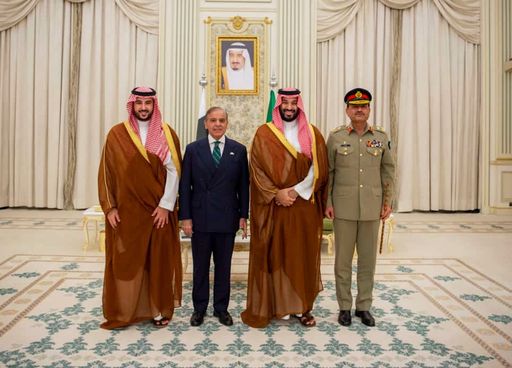Pakistan's Foreign Minister Ishaq Dar has said other countries may be interested in signing defence agreements with the South Asian nuclear-armed country, days after Saudi Arabia and Pakistan inked a landmark security pact, committing to mutual defence in the event of an attack on either nation.
"It's premature to say anything, but some other countries want to enter into an agreement of this nature," Dar told reporters in London, according to Dawn news site.
He noted that the agreement with Riyadh "was not signed overnight; it has taken several months."
On Wednesday, Saudi Crown Prince Mohammed bin Salman and Pakistani Prime Minister Shehbaz Sharif signed the pact in Riyadh.
A joint statement said the agreement "reflects the shared commitment of both nations to enhance their security and to achieve security and peace in the region and the world," adding: "Any aggression against either country shall be considered an aggression against both."
Dar welcomed the deal, recalling Saudi support during difficult times.
"Saudi Arabia has stood with us during difficult times, such as the sanctions. Their support was very relevant and important," he said.

Pakistani Defence Minister Khawaja Asif said on Thursday the pact also covers nuclear protection.
"What we have, our capabilities, will absolutely be available under this pact," he said, stressing Pakistan "is a responsible nuclear power," a status that has "never" been challenged.
Retired Saudi Air Force Brigadier General Faisal al-Hamad told the Al-Arabiya television the agreement "adopts the NATO principle that an attack on one is an attack on all."
The defence pact between the two countries was signed a week after an Israeli attack on the Qatari capital, killing five Hamas peace negotiators and a Qatari security officer.
Pakistan conducted its first nuclear tests in 1998 and remains the only Muslim-majority country with nuclear weapons.
The country has an army of more than 600,000, often positioned against its much larger nuclear rival neighbour, India.
The two states have fought three wars and numerous clashes over disputed Kashmir, including a four-day conflict in May, marked by intense fighting and Pakistan's downing of multiple Indian jets, initially denied but later conceded by New Delhi.

India's reaction
On Friday India voiced concern, saying it hoped Saudi Arabia would consider its relationship with New Delhi as it deepens ties with Islamabad.
"India and Saudi Arabia have a wide-ranging strategic partnership which has deepened considerably in the last few years," Indian Foreign Ministry spokesperson Randhir Jaiswal said during a weekly briefing in Mumbai.
"We expect that this strategic partnership will keep in mind mutual interests and sensitivities."
Saudi Arabia is one of India's largest petroleum suppliers.
The two countries also agreed this year to expand cooperation in crude and liquefied petroleum gas and have explored joint refinery and petrochemical projects.
On Thursday, India's Foreign Ministry said it was aware the Saudi-Pakistan pact had been under consideration and would study its implications.
Analysts noted the agreement could extend Riyadh a de facto nuclear shield under the terms of mutual defence.
For Pakistan, the pact marks deepening security ties with one of its closest allies, while for India it introduces new complexities into its strategic calculations with both countries.




















